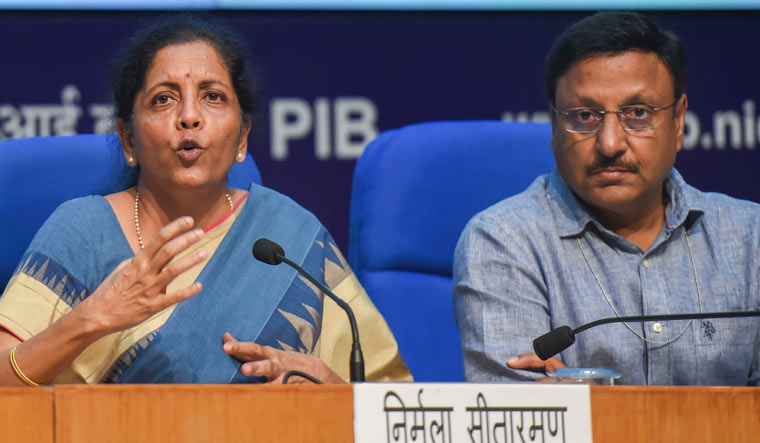In what seemed like the first instalment of the government’s stimulus package to revive the sagging Indian economy, Finance Minister Nirmala Sitharaman on Friday took some steps to push up demand, particularly in the automobile sector seen to have been worst hit by its sheer volume. The ban on purchase of new vehicles by the government departments was lifted, and it seems likely ministers and officers will soon have gleaming new vehicles.
Another instalment is expected to come soon, and specifically address the infrastructure sector. And many sectors will obviously have to wait for their turn.
Sitharaman announced the release of funds—Rs 70,000 crores—through the public sector banks besides additional lending and liquidity of Rs 5 lakh crore as upfront capital, saying this would benefit the corporates, retail borrowers, MSMEs and small traders, among others.
Also read
- IMF raises India's growth projection to 6.8 pc; growth in China likely to slow to 4.6 pc
- India fastest growing economy during last 3 financial years: Nirmala Sitharaman
- Double economy, exports: PM Modi's growth plan for probable 3rd term
- Corporate credit rating upgrades continue to outweigh downgrades
- 'I don't have money to contest Lok Sabha elections': Nirmala Sitharaman
- Nirmala Sitharaman confident of India Inc aligning to country's developmental goals
The minister appears to have conceded to the demands of the captains of industry who had pitched for a roll back of the income tax and cess on the super rich with incomes over Rs 5 crore a year and Rs 10 crore a year, and the criminalisation of violation of CSRs. These were a part of Budget 2019-20 of last month. However CSR violations will be treated as civil liability and corporates have been provided revised orders granting time for completing ongoing projects as part of their CSR obligations.
Among other measures to stimulate the economy is the directive to banks to effect timely rate cuts and thus pass the RBI cut to benefit all borrowers, as well as make working capital loans for industry cheaper. This is expected to provide credit not only for the purchase of white goods and automobiles, but also homes, and thus impact the flagging realty sector. Loan applications will be available online, adding a step to track transparency and accountability. PSBs have also been directed to return loan documents within 15 days of loan closure, in order to benefit those who have mortgaged assets.
Private savings and private investments had shrunk, and the capital market had also taken a hit. Sitharaman’s announcement of relief from enhanced surcharge on capital gains in the long term as well as short term is aimed at boosting public investment in the capital market. This was also a part of the recent budget.
The minister also withdrew the angel tax provisions for startups and their investors, again a part of Budget 2019. Going a step further, she said a dedicated cell had been set up under the Central Board of Direct Taxes to assess issues concerning startups, and they have been promised a quick, time-bound solution to these issues.
There has been no immediate response to Sitharaman's announcements, and it is likely that many sectors may say they have not been included in the first list of stimulus.
As it stands today, this is unlikely to stimulate investments in MSMEs which, however, may be offered credit. Equally how this will push up rural demand without a roadmap of how rural incomes will be enhanced.



